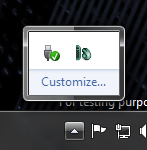With the market share that Microsoft has, they simply don't have the luxury of dropping 32-bit OS on the dot.
However, most laptops and PC from OEM such as Dell and HP today come with Vista 64-bit, if it makes any difference.
They don't have to just drop it though. Remember Microsoft already has their own virtual machine technology called Virtual PC. They could simply include that in Windows 7 and throw in the 32 bit edition of Windows 7 or Vista or XP or whatnot as a virtual machine image. Then they could sell only 64 bit versions of Windows 7 and almost everybody would be happy. Legacy and corporate users would still have everything working. Tech savvy users could have the latest tech in a clean OS without the weight of 32 bit baggage. It's been done before in OSX.
Eventually the switch will occur. As you've stated most vendors ship any system with 4 gigs of ram or more with 64 bit editions of Windows. It's just that the switch could have been made a lot sooner if virtual machine technology had been used years ago.
This is all acceptable differences we are talking. Anyone missing BeOS's <10 seconds boot times? As long we are not there, I don't believe there was an evolution of OSes <sigh>
Hell yeah! BeOS was an incredible OS way ahead of it's time. So was the Amiga OS now that we've gotten sidetracked.
Some Linux guys have squeezed a 5 second bootup time from a modified Linux install - and that was on a hard drive and not even a solid state drive. The technology is already here. It's just OSX and Windows have become so incredibly bloated that they spend ridiculous amounts of time in their bootups.



